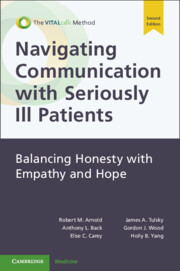Book contents
- Navigating Communication with Seriously Ill Patients
- Navigating Communication with Seriously Ill Patients
- Copyright page
- Dedication
- Reviews
- Contents
- Preface
- Acknowledgments
- 1 Taking Your Skills to the Next Level
- 2 Foundational Communication Skills
- 3 Talking about Serious News
- 4 Discussing Prognosis
- 5 Planning for the Future: Discussing What’s Important, Well Before a Crisis
- 6 Discussing Treatment Decisions
- 7 Between the Big Events
- 8 Goals of Care in Late-Stage Disease
- 9 Conducting a Family Conference
- 10 Dealing with Conflicts between Clinicians and Patients
- 11 Working Through Conflicts with Colleagues
- 12 When You’re Really Stuck
- 13 Talking about Dying
- 14 Cultivating Your Skills
- Index
- References
10 - Dealing with Conflicts between Clinicians and Patients
Moving from “Who’s Right?” to “What’s Our Shared Interest?”
Published online by Cambridge University Press: 05 April 2024
- Navigating Communication with Seriously Ill Patients
- Navigating Communication with Seriously Ill Patients
- Copyright page
- Dedication
- Reviews
- Contents
- Preface
- Acknowledgments
- 1 Taking Your Skills to the Next Level
- 2 Foundational Communication Skills
- 3 Talking about Serious News
- 4 Discussing Prognosis
- 5 Planning for the Future: Discussing What’s Important, Well Before a Crisis
- 6 Discussing Treatment Decisions
- 7 Between the Big Events
- 8 Goals of Care in Late-Stage Disease
- 9 Conducting a Family Conference
- 10 Dealing with Conflicts between Clinicians and Patients
- 11 Working Through Conflicts with Colleagues
- 12 When You’re Really Stuck
- 13 Talking about Dying
- 14 Cultivating Your Skills
- Index
- References
Summary
Sometimes patients and clinicians don’t agree and there is conflict. Many people prefer to avoid conflict, however working through it allows us to discuss our differences of opinion, explore the options, and come up with an agreement that we all can live with. Good communication skills can help shift the focus from “Who’s right?” to “What’s our shared interest?” This roadmap is different as it is about how you find your path amidst conflict. Start by noticing there is a disagreement. Prepare yourself by pausing, being curious, and assuming positive intent. Invite the other person’s perspective and listen to their story, emotion, and what it means to their sense of self. Identify what is at the root of the conflict and if possible, articulate it as a shared interest. Brainstorm to address the shared interest, and look for options that address everyone’s goals. Remember that conflicts occur because people care deeply, which means that resolving the conflict will take time and effort. Even in instances where it is not possible to agree, skillful communication can allow for graceful disagreement.
- Type
- Chapter
- Information
- Navigating Communication with Seriously Ill PatientsBalancing Honesty with Empathy and Hope, pp. 155 - 166Publisher: Cambridge University PressPrint publication year: 2024

